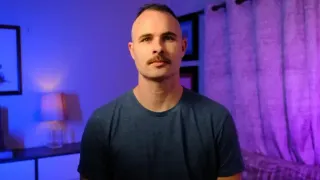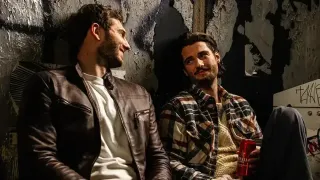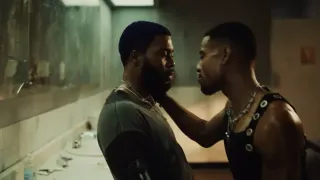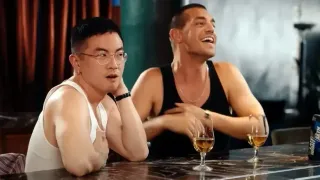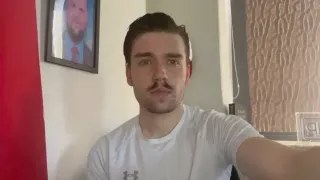April 24, 2016
Leader of SF Parks Alliance Marks 5 Years
Matthew S. Bajko READ TIME: 4 MIN.
Cole Valley resident Matthew O'Grady, an avid cyclist, often biked through the triangular open space bounded by Lincoln Way and Kezar Drive on his way from his home to Golden Gate Park.
For years the area, dubbed Kezar Triangle, was a "real dead zone," said O'Grady, "with more gopher holes than pieces of grass."
That changed two years ago, after a $670,000 renovation of the 2.8 acre plot of land funded by the Friends of Kezar Triangle, which was created in 2010 by Carla Crane, with the Carla and David Crane Foundation. It now features flowering beds, a bench carved out of a single log, and an art garden tended to by artists who use the plant materials in their works.
"The result is now it is a destination in its own right," said O'Grady. "You see people here picnicking and playing with their dogs."
O'Grady, who is gay, had selected the site to meet with the Bay Area Reporter for an interview about his marking his fifth year as chief executive officer of the San Francisco Parks Alliance. The nonprofit agency is a leading advocate at City Hall for funding of the city's numerous parks and recreation facilities.
It also partners with scores of community groups that have adopted various city parks to serve as stewards of the sites. More than 200 groups, such as the Friends of Kezar Triangle, are fiscally sponsored by the parks alliance.
"We use philanthropy and civic engagement to protect, sustain, and enrich San Francisco's parks, recreation, and open green spaces," said O'Grady.
He had chosen the Kezar Triangle site as a meeting place in order to show off what the Parks Alliance and community groups, in partnership with the San Francisco Recreation and Park Department, can achieve. The site is a model for how overlooked green spaces in the city can be re-imagined into inviting public realms.
"The traditional way is philanthropists raise the money and give it to the recreation and park department. Here we did the contrary," said O'Grady. "We managed the renovation of the place, and when finished, we gifted it back to the recreation and park department."
O'Grady was hired in October 2011 to be the executive director of the Parks Alliance, which was created by the merger of the Neighborhood Parks Council and San Francisco Parks Trust. Blending together policy work and advocacy into one agency presented a significant challenge in the beginning, he said.
"There was a lot to do to put the new organization together," said O'Grady, a 29-year resident of the city who relocated to the Bay Area from the suburbs of Chicago, where he grew up. "It required big shifts in the culture of both staffs of the two former agencies, which had different styles and boards of directors."
He has spent his career focused on helping nonprofits expand their capacity. In 1990, O'Grady started his own independent consulting practice, working with such nonprofits as KQED, Yerba Buena Center for the Arts, Shelter Network, and the David and Lucile Packard Foundation.
In 1998 the Management Center hired him as an associate executive director, and he created its executive search service, as well as a program to train executives. The Taproot Foundation recruited him in 2004 to assist the start-up in expanding nationally.
He has also served on the boards of several nonprofits. Between 1996 and 1998 he chaired the board of AIDS services organization the Shanti Project.
As he marks five years at the helm of the Parks Alliance, O'Grady said he has no plans to leave. He is focused on helping to shepherd the creation of the Blue Greenway, a 13-mile stretch of park space along the city's southeastern waterfront, as well as raising funds to upgrade 33 playgrounds in the city the agency has deemed as failing.
"This job continues to allow me to do something for the city I love, on a topic that is near and dear to my heart," said O'Grady.
The former Boy Scout has always had a love for the outdoors. He met his husband, Steve Van Landingham, a regional development director at the National Resources Defense Council, through the LGBT cycling club Different Spokes.
"We both knew the other was an outdoorsy kind of guy," said O'Grady, who said he "isn't old enough" when asked how old he is. (Public records indicate he is in his 60s.)
The Parks Alliance, which had assets totaling more than $20 million in 2015, doesn't track how much it raises from LGBT or straight donors. Its mission impacts all city residents, noted O'Grady, who earned $139,502 in 2013, according to the agency's most recent tax filing.
"Practically everybody in San Francisco loves their parks. Even people who don't use them often say they are important," he said. "That cuts across any demographic, sexual orientation, and age group; it doesn't matter. In a super dense, urban city parks are our lungs."
Yet the parks are suffocating in terms of financial support, contends the Parks Alliance. It points out that the city's general fund has grown 43 percent over the last 15 years, but general operating support for parks has only grown 30 percent.
To remedy the fiscal picture, the agency partnered with District 2 Supervisor Mark Farrell to draft Proposition B on the June ballot. The charter amendment, which has broad support and is likely to pass, would create a designated set aside within the city's budget for the recreation and park department.
It would result in roughly $1 billion in "new, sustainable park funding over the next 30 years," according to the Parks Alliance.
Even if adopted, O'Grady said the city's green spaces would continue to need the public's support.
"I have come to see how important parks and open spaces are to the people in San Francisco," he said. "We can no longer rely on government to take care of our parks. We all have to chip in."

